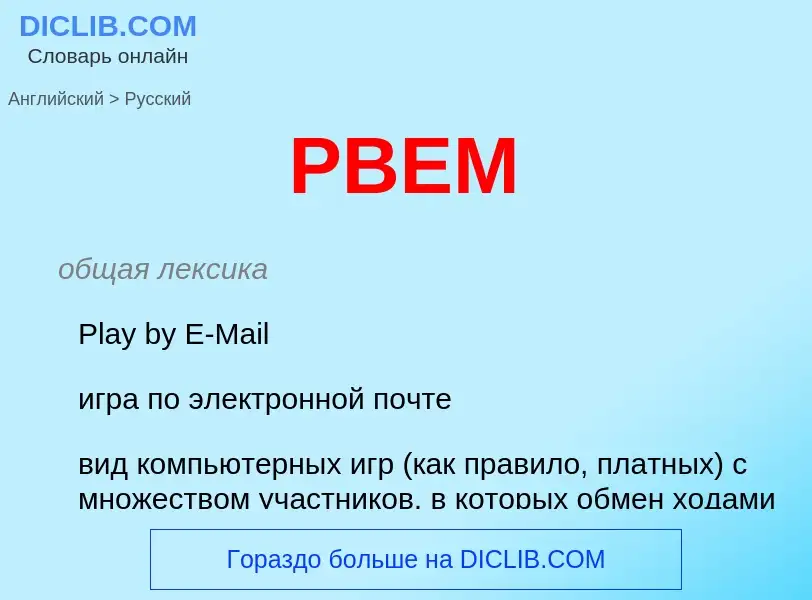Übersetzung und Analyse von Wörtern durch künstliche Intelligenz ChatGPT
Auf dieser Seite erhalten Sie eine detaillierte Analyse eines Wortes oder einer Phrase mithilfe der besten heute verfügbaren Technologie der künstlichen Intelligenz:
- wie das Wort verwendet wird
- Häufigkeit der Nutzung
- es wird häufiger in mündlicher oder schriftlicher Rede verwendet
- Wortübersetzungsoptionen
- Anwendungsbeispiele (mehrere Phrasen mit Übersetzung)
- Etymologie
PBEM - Übersetzung nach russisch
общая лексика
Play by E-Mail
игра по электронной почте
вид компьютерных игр (как правило, платных) с множеством участников, в которых обмен ходами осуществляется по e-mail. Например, www.sargona.ru
Wikipedia
A play-by-mail game (also known as a PBM game, PBEM game, or a turn-based game) is a game played through postal mail, email or other digital media. Correspondence chess and Go were among the first PBM games. Diplomacy has been played by mail since 1963, introducing a multi-player aspect to PBM games. Flying Buffalo Inc. pioneered the first commercially available PBM game in 1970. A small number of PBM companies followed in the 1970s, with an explosion of hundreds of startup PBM companies in the 1980s at the peak of PBM gaming popularity, many of them small hobby companies—more than 90 percent of which eventually folded. A number of independent PBM magazines also started in the 1980s, including The Nuts & Bolts of PBM, Gaming Universal, Paper Mayhem and Flagship. These magazines eventually went out of print, replaced in the 21st century by the online PBM journal Suspense and Decision.
Play-by-mail games (which became known as "turn-based games" in the digital age) have a number of advantages and disadvantages compared to other kinds of gaming. PBM games have wide ranges for turn lengths. Some games allow turnaround times of a day or less—even hourly. Other games structure multiple days or weeks for players to consider moves or turns and players never run out of opponents to face. If desired, some PBM games can be played for years. Additionally, the complexity of PBM games can be far beyond that allowed by a board game in an afternoon, and pit players against live opponents in these conditions—a challenge some players enjoy. PBM games allow the number of opponents or teams in the dozens—with some previous examples over a thousand players. PBM games also allow gamers to interact with others globally. Games with low turn costs compare well with expensive board or video games. Drawbacks include the price for some PBM games with high setup and/or turn costs, and the lack of the ability for face-to-face roleplaying. Additionally, for some players, certain games can be overly complex, and delays in turn processing can be a negative.
Play-by-mail games are multifaceted. In their earliest form they involved two players mailing each other directly by postal mail, such as in correspondence chess. Multi-player games, such as Diplomacy or more complex games available today, involve a game master who receives and processes orders and adjudicates turn results for players. These games also introduced the element of diplomacy in which participants can discuss gameplay with each other, strategize, and form alliances. In the 1970s and 1980s, some games involved turn results adjudicated completely by humans. Over time, partial or complete turn adjudication by computer became the norm. Games also involve open- and closed-end variants. Open-ended games do not normally end and players can develop their positions to the fullest extent possible; in closed-end games, players pursue victory conditions until a game conclusion. PBM games enable players to explore a diverse array of roles, such as characters in fantasy or medieval settings, space opera, inner city gangs, or more unusual ones such as assuming the role of a microorganism or a monster.

.png?width=200)
